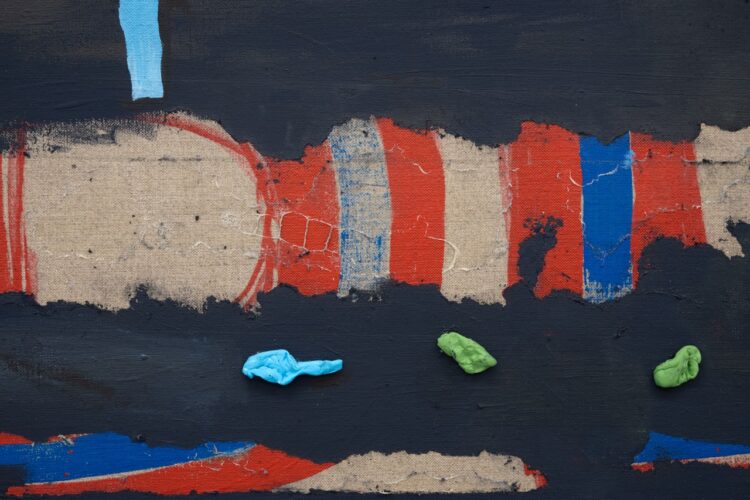South Parade presents I Love Tomorrow, a solo exhibition by Audrey Gair, the artist’s first in London.
Gair collects diverse historical sources, spanning eras and genres of painting, then flattens them into one visual language. Often grounding her work in abstract expressionist or color field planes, she modifies initial inspirations through the depiction of painting moves themselves like wrapping, ripping, and rendering. She reacts to her own gestures, pivoting towards a harmonious stopping point between components of the picture plane. Every painting is a new puzzle for Gair to take on. She wittingly arranges her background as foreground, while still building the paintings out from the canvas. The way paint behaves is crucial to her work; with drying time, thickness, and interaction between mediums, the material brings an enforced meditation period. The works inform one another to create their own logic. Methods of brush control, experimental collage, and composition are fine-tuned to support moments of strange novelty.
She wrestles two distinct layers that move together, managing their role and presence: first, second, front, back. As seen in Brother, Gair uses oil primer to produce a chalky flat white plane, then establishes a sequence of horizontal lines alternating with the primer. The stripes are intersected by a stark shape with jagged edges, like a bedded sheet of torn printer paper. The negative space runs along the bottom of the canvas, finally curbed by stripes as they resume their pattern. The abstracted content plays against a nod to reality – a chewed piece of pink clay gum is stuck on a dusting of confetti marks, some covered by a wide orange band, others fresh atop the primer. Gair fortifies the white of the page to engage in a total approach to image making, presenting herself with an imaginary prompt: “make any background, then here, paint something completely different, now, how will you compliment the two?” Parsing through competitive layers is a primary undertaking in the paintings; as if it were an equation, considerations must be made to either side to reach equilibrium.
In Blue, bare linen with red and blue text is obscured by four bands and an assembly of realistic ‘chewed gum’ sculpted from clay. Trompe l’oeil ‘torn paper’ is repeated here with the raw horizontal black stripes. Gair weighs the amount of discernible content against the will of the material. In Strip of Paper, a vertical diptych, the artist’s methods are referred to directly in the title. Strip of Paper becomes both the object itself and the technique with which she creates compositional compromise. Gair presents the action in her work, addition, negation, representation, all at once. Painted Pumpkin, Wheat, and How to Paint a Wall openly declare themselves in their title. Gair strikes a formal balance while leaving source material as open-ended or concrete as she deems necessary. By establishing the entire index of mark-making possibilities as equally valuable, Gair welcomes high/low techniques. Personal style imparts an agency over her references, however random they may seem. She manipulates oil paint to mimic the materiality of dirt, markers, construction paper, tie-dye fabric, and a fence. Gair observes a liberty in the way people can make visual decisions and associations in their daily lives. She tries to harness this permissive attitude, subverting her own compulsions to surprise herself.
Gair’s work bridges learned formal techniques with anti-style mark-making tendencies into a singular expression. How can an artist, with expertise in oil painting and the breadth of Modernism, distill universal acts of visual subjectivity and, most importantly, employ their own as a tool to represent life in the painting process? The works are charged in their specificity, yet cohesive in their freedom. Gair’s practice is about the craft of painting – a love letter to the medium’s potential.
Text by Sasha Miasnikova
xxx
Audrey Gair | I Love Tomorrow | 28 March – 27 April
